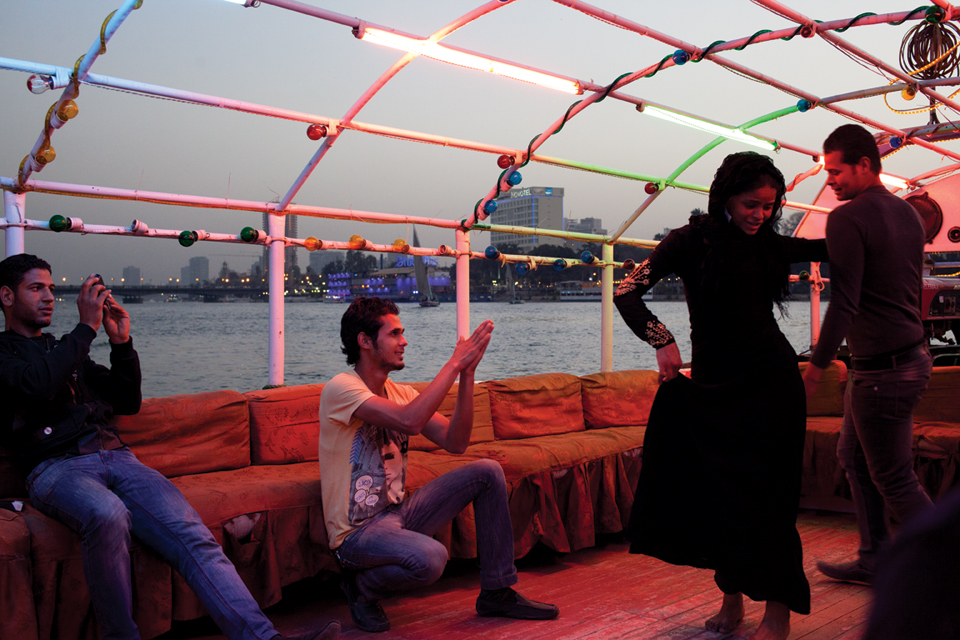Cairo finds a voice in festival music.
Ahmed Farid, aka DJ Figo, sips anise tea with his crew at an open air café in Al Salam City, Egypt. They are fresh-faced and confident, dressed in bright combinations that merge American hip-hop style with Cairo street swagger. The men seated around them look drab in comparison, killing time smoking cigarettes and the occasional shisha waterpipe, their wizened faces turned toward a horizon blocked by endless apartment rows. It is 1AM in the cement-and-sand outskirt city. The waiting room of a nearby 24-hour X-ray clinic is packed, someone’s getting a trim at the hair salon next door and the vintage sound of Oum Koulsoum’s perfect voice pours out from a café speaker. Even three decades after her death, she remains the Arab world’s most famous singer, but after a day of listening to the synthy, Auto-Tuned beats pioneered by DJ Figo, she starts to sound downright ancient.
“Before Figo, there was no music,” says Smiley, a round-faced LMFAO fan wearing a tweed cap. Smiley is just one in an extended crew congregating around Figo as he strolls through his hometown. He’s also not the only guy in Al Salam City to have called Figo a something-from-nothing inventor over the course of a week this past March. History looms crushingly large in Egypt, where the present can often seem like a footnote to a majestic past. The same goes for its music: classical Egyptian greats like Koulsoum and Abdel Halim Hafez dominated the international Arabic market for most of the 20th century, but Figo has found a way to make his songs feel like more than a musical aside, influenced by predecessors like Ahmed Adaweya, a musician who gained widespread fame in the 1970s for a sweaty, roughneck shaabi (meaning literally, “of the people”) sung in an Egyptian dialect as opposed to elegant Arabic. At 20, Figo has bypassed his predecessors and their reliance on traditional musicality, and showed Egypt what it can sound like to make music with nothing but a computer.
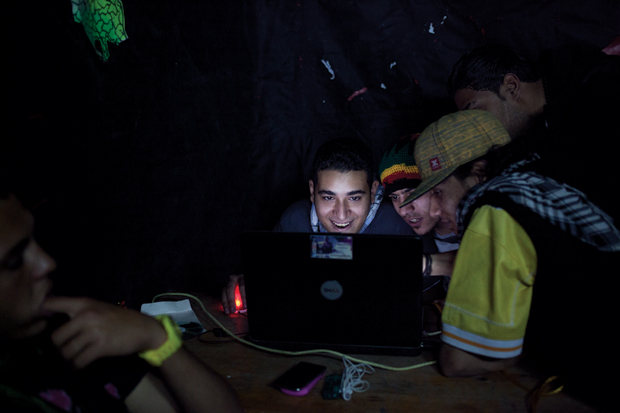 About six years ago, Figo began searching “how to make beats” on YouTube. He doesn’t speak English, so studying screenshots had to suffice, and he began making songs that kept with the anti-sentimental and ultra-local attitude of shaabi while electrifying it with imported genres like hip-hop and techno. “We learn what the songs are about by watching the videos,” explains rapper Alaa Fifty Cent. Figo and Alaa Fifty made their public debut at a city festival in 2007, and by sundown the following day, their inadvertent hit single “Al Salam City Festival” was rippling beyond Cairo. It’s easy to understand why: the rugged baladi rhythms, ever popular at weddings, shed their folksy connotations when programmed on drum machines. Crunk-compatible synth lines played in Eastern scales brighten this new sonic landscape, while sub-bass provides oomph and Auto-Tune covers up any pitchiness in the vocals. They call this giddy, effervescent sound mahraganat (festival). Stores don’t carry it, the radio won’t play it, but festival has become the heartbeat of Cairo’s bustle and roar. It blasts out of minibus vans and tuk-tuk motorcycle taxis across a city of 20 million. It can be heard wafting out from the low-rent pleasure boats cruising the Nile, and transmits itself via the most mobile sound systems of all: cellphones.
About six years ago, Figo began searching “how to make beats” on YouTube. He doesn’t speak English, so studying screenshots had to suffice, and he began making songs that kept with the anti-sentimental and ultra-local attitude of shaabi while electrifying it with imported genres like hip-hop and techno. “We learn what the songs are about by watching the videos,” explains rapper Alaa Fifty Cent. Figo and Alaa Fifty made their public debut at a city festival in 2007, and by sundown the following day, their inadvertent hit single “Al Salam City Festival” was rippling beyond Cairo. It’s easy to understand why: the rugged baladi rhythms, ever popular at weddings, shed their folksy connotations when programmed on drum machines. Crunk-compatible synth lines played in Eastern scales brighten this new sonic landscape, while sub-bass provides oomph and Auto-Tune covers up any pitchiness in the vocals. They call this giddy, effervescent sound mahraganat (festival). Stores don’t carry it, the radio won’t play it, but festival has become the heartbeat of Cairo’s bustle and roar. It blasts out of minibus vans and tuk-tuk motorcycle taxis across a city of 20 million. It can be heard wafting out from the low-rent pleasure boats cruising the Nile, and transmits itself via the most mobile sound systems of all: cellphones.
As it happens, Amr Mohamed was working as a PC repairman and selling personalized ringtones on the side in the nearby city of Ain Shams when he first heard Figo’s “Al Salam Festival.” Suddenly, a world of sonic possibility opened up to him. His facility with software made it easy to splice genres and coax Western synthesizers into the intricate quarter-tone tuning of Eastern maqam scales. Mohammed dubbed himself Amr 7a7a (the “7” denotes the breathy sound of Arabic’s aspirated “h”), and within a year, his productions propelled him to the top of the festival scene, a new rival to DJ Figo. A brief but intense beef flared, with the artists quickly realizing that joining forces made more sense. Mohamed, the taciturn IT guy, was complemented perfectly by Figo’s gregarious magnetism, not to mention his stable of hungry MCs. Now they work and perform together, with 7a7a making a daily two-hour commute to Figo’s studio in Al Salam City.
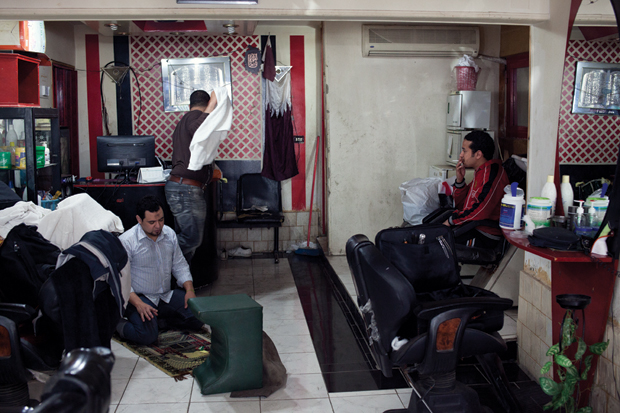 Viewed from above, Al Salam resembles a modernist grid. After the 1992 earthquake left 50,000 homeless, the Egyptian army hastily erected brutalist apartment blocks in the middle of a desert plain. Twenty years later, the buildings have petrified into permanence, while its inhabitants sculpt the city, quietly affirming that the real Revolution is not in Tahrir Square, but any place where bleak government structures humanize and bloom with ground-up creativity. An alleyway becomes a wedding hall, a rooftop doubles as a pigeon coup, the space around a Playstation under an awning expands to become a communal living room. In Figo’s case, a storage unit on the corner of the building where he and his family live becomes the recording studio where he invents his music. FIGO is hand-painted in crude, green brushstrokes beside the entry. The interior is cramped with stacked speakers and illuminated by blacklight. Last week, a rising festival duo from a few towns over insulted Figo’s mother via YouTube. Today, Al Salam City bites back with a catchy retort song; it’s this type of aesthetic combat that keeps festival strong.
Viewed from above, Al Salam resembles a modernist grid. After the 1992 earthquake left 50,000 homeless, the Egyptian army hastily erected brutalist apartment blocks in the middle of a desert plain. Twenty years later, the buildings have petrified into permanence, while its inhabitants sculpt the city, quietly affirming that the real Revolution is not in Tahrir Square, but any place where bleak government structures humanize and bloom with ground-up creativity. An alleyway becomes a wedding hall, a rooftop doubles as a pigeon coup, the space around a Playstation under an awning expands to become a communal living room. In Figo’s case, a storage unit on the corner of the building where he and his family live becomes the recording studio where he invents his music. FIGO is hand-painted in crude, green brushstrokes beside the entry. The interior is cramped with stacked speakers and illuminated by blacklight. Last week, a rising festival duo from a few towns over insulted Figo’s mother via YouTube. Today, Al Salam City bites back with a catchy retort song; it’s this type of aesthetic combat that keeps festival strong.
Inside the studio, Figo powers up his laptop, confirming the worst: his dubious Windows installation has collapsed into a data swirl of Arabic, Russian and English gibberish. Even harder to root out than self-replicating malware are the Facebook grifters who impersonate DJ Figo and 7a7a online. At last count, there were seven fake Figo Facebook pages, a natural byproduct of festival’s surging popularity, especially in a country long accustomed to rumor and misinformation. Amr 7a7a’s laptop runs without issue, and he fiddles with a mixer and equalizer, ignoring the friends who come in off the street to say hello. There’s no door, only a metal grate that they keep half-raised when studio is in session. Gradually, the hangout focuses and Mohamed sends a sleek riddim looping out of the speakers, grinning like a mad scientist in the pallid glow of his computer screen. Sadat, Alaa and Figo swap verses, their vocals shimmering with Auto-Tune, transforming the blacklit storage unit into a laboratory, or maybe an incubator.
Of course, not everybody sees it this way. “They just bang on a computer until it sounds good!” says translator Ahmed Shawka. Like many Egyptians, Shawka hears this latest development in shaabi music as nothing but unskilled noise. But it’s precisely because you can make shaabi without formal musical training that the Al Salam City kids are able to produce a sound describing what it is to be young in Egypt’s wired and uncertain times. Festival was never intended to be political music, but the Egyptian Revolution has inadvertently changed the way it’s being viewed. In fact, you can find the word “shaabi” inside the Arab Spring’s most famous slogan: “Al-sha’b yurid isqaat al-nizam!” (“The people want to bring down the regime!”) “The people” comes from the same root, and with it come revolutionary notions about the working class. Figo’s crew flipped this slogan brilliantly, turning it into an infectious posse cut called “The People Want Five Pounds of Phone Credit.” Sadat and their friend Ahmed Habib wrote the lyrics in Egyptian street Arabic, which is as different from the modern standard Arabic of the original slogan as a rap verse is from a television newscast. The people want something new, sing Figo, Sadat, Alaa Fifty and Hussein Ghandy. The people want five pounds phone credit/ The people want to bring down the regime/ But the people are so damn tired.
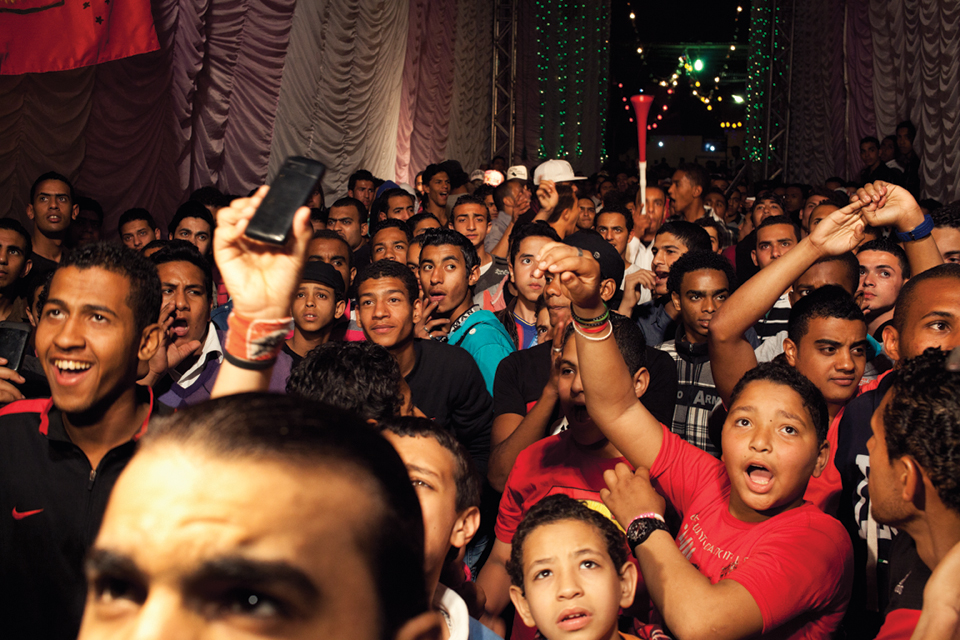
For the past year and a half, protestors, onlookers and international media have transformed the traffic circle known as Tahrir Square into an agora, a focal point for the revolution, which ousted President Mubarak in early 2011. A full spectrum of protest musicians used Tahrir as a stage, from Pete Seeger-styled oud-strummers to “get out and vote” anthems by Islamists and rappers folding social criticism into staccato Arabic flows. Festival is sly and impatient with the political sloganeering that sounds out in Tahrir Square, and there’s also a generational divide: Mubarak was president for 29 years, longer than many festival fans have been alive. More concerned with a savvy, scrappy worldview than doling out prescriptions for how to live, festival is in tune with the city’s shakily democratic subconscious, thriving in the edgy social space opened up by the Arab Spring.
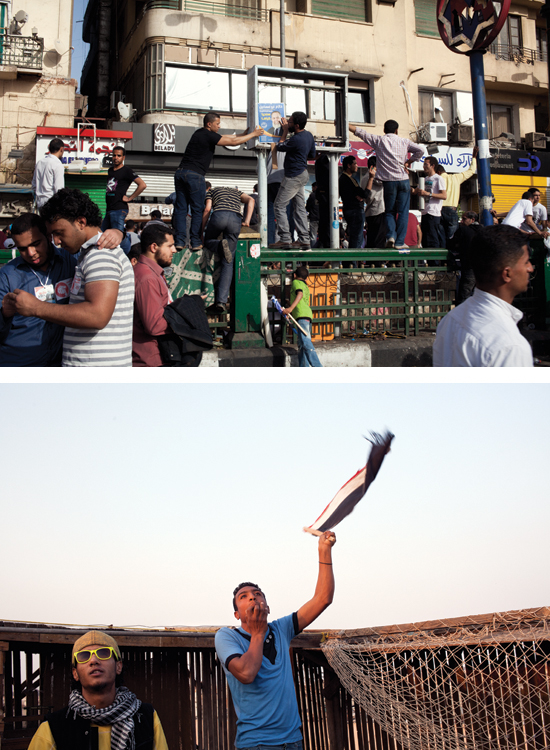 This spring, three months before the main election, Tahrir is mostly calm, but the walls along nearby Avenue Mohamed Mahmoud form a stunning memorial to activists slain in the uprising, an eye-popping jumble of graffiti that mixes hieroglyphics, stark portraits, Banksy-esque political whimsy and trompe l’oeil. One street over, near the Ministry of the Interior, this expression halts at an enormous stone blockade that the government erected, along with many others like it, to avoid being rushed by protestors. The impediment makes for bad traffic and provokes citizens already on edge. A group of activists have set about dismantling it, using scrap rope and metal poles to try to pry it down, block by block. A few dozen journalists have scrambled over the blockade to stand facing a phalanx of bristling riot cops. Most of them are tweeting. Sensible Egyptians who know the effects of tear gas stay on the other side of the blockade, out of reach of the armored police. “We are the people who built the pyramids,” goes a circulating joke, “so we can take down these walls.” After several failed attempts and one guy nearly getting his legs crushed, the protestors succeed, and a boulder tumbles down six feet, landing in a stomach-rattling thud, the ground shuddering with a power that is as symbolic as it is physical. Fifteen minutes later, another stone tumbles.
This spring, three months before the main election, Tahrir is mostly calm, but the walls along nearby Avenue Mohamed Mahmoud form a stunning memorial to activists slain in the uprising, an eye-popping jumble of graffiti that mixes hieroglyphics, stark portraits, Banksy-esque political whimsy and trompe l’oeil. One street over, near the Ministry of the Interior, this expression halts at an enormous stone blockade that the government erected, along with many others like it, to avoid being rushed by protestors. The impediment makes for bad traffic and provokes citizens already on edge. A group of activists have set about dismantling it, using scrap rope and metal poles to try to pry it down, block by block. A few dozen journalists have scrambled over the blockade to stand facing a phalanx of bristling riot cops. Most of them are tweeting. Sensible Egyptians who know the effects of tear gas stay on the other side of the blockade, out of reach of the armored police. “We are the people who built the pyramids,” goes a circulating joke, “so we can take down these walls.” After several failed attempts and one guy nearly getting his legs crushed, the protestors succeed, and a boulder tumbles down six feet, landing in a stomach-rattling thud, the ground shuddering with a power that is as symbolic as it is physical. Fifteen minutes later, another stone tumbles.
Anonymous protestors like these become folk heroes; their feats retold via the internet’s irrepressible word-of-mouth. Politics here can be raw energy, but the people are so damn tired. Figo and his friends voice what a city of underdogs feels, and as the ecstatic digital arm of the people’s music, festival makes more sense than ever in a post-revolutionary Cairo wired with possibility. One obvious result of Al Salam City’s sound taking hold is the start of a weekly festival party in downtown Cairo. Every Saturday, crowds gather at the After Eight bar a few blocks from Tahrir. Drink minimums price out the average fan, so the room fills with monied Cairenes and curious expats. In the absence of a stage, MCs hop up on a dark windowsill to play to the cheering crowd. This sort of event, a shaabi party in a swank downtown bar, would have been unthinkable a year ago. The social stigma held that only shantytown roughs would want to hear this music. Egypt may be filled with debate about how substantial the political change will be, but the cultural shift is clear: the people’s music is starting to move crowds all over the country.
 A few days later back in Al Salam City, Sadat and Alaa Fifty meet up with some friends on a rooftop. Sadat’s a short and wiry MC whose omnipresent Rasta cap hides his thinning hair. His voice is perpetually hoarse from talking. Fifty is quieter. In yellow sunglasses, a matching keffiyeh and a backwards Burberry hat, he prefers to let his flamboyant clothing do the talking. Their friend whips an Egyptian flag around, not out of political fervor but rather to cue the flock of pigeons he trains, which set off in a pinwheel across the sky. The discussion turns to festival, with the crew hypothesizing about how they might expand. Locally, the scene is diversifying. Alaa’s buddy Islam Chipsy has developed his own insane take on shaabi, galvanizing street parties with a style that bridges FruityLoops laptop kids and original shaabi trailblazers like Ahmed Adaweya. Equipped with only a keyboard, Chipsy plays in an exuberant, acrobatic style, triggering drum machine loops and going from nimble, Nile-melody solos to absurdist tone-waves made by running his hands across the length of the keyboards. It’s electrifying. Whenever possible, he performs flanked by twin percussionists banging out baladi rhythms on Western rock kits. Chipsy’s live act is well positioned to wow international stages, but the beats of Figo and 7a7a will thrill DJs worldwide, snuck in, between hip-hop bangers on the dancefloor.
A few days later back in Al Salam City, Sadat and Alaa Fifty meet up with some friends on a rooftop. Sadat’s a short and wiry MC whose omnipresent Rasta cap hides his thinning hair. His voice is perpetually hoarse from talking. Fifty is quieter. In yellow sunglasses, a matching keffiyeh and a backwards Burberry hat, he prefers to let his flamboyant clothing do the talking. Their friend whips an Egyptian flag around, not out of political fervor but rather to cue the flock of pigeons he trains, which set off in a pinwheel across the sky. The discussion turns to festival, with the crew hypothesizing about how they might expand. Locally, the scene is diversifying. Alaa’s buddy Islam Chipsy has developed his own insane take on shaabi, galvanizing street parties with a style that bridges FruityLoops laptop kids and original shaabi trailblazers like Ahmed Adaweya. Equipped with only a keyboard, Chipsy plays in an exuberant, acrobatic style, triggering drum machine loops and going from nimble, Nile-melody solos to absurdist tone-waves made by running his hands across the length of the keyboards. It’s electrifying. Whenever possible, he performs flanked by twin percussionists banging out baladi rhythms on Western rock kits. Chipsy’s live act is well positioned to wow international stages, but the beats of Figo and 7a7a will thrill DJs worldwide, snuck in, between hip-hop bangers on the dancefloor.
Still, festival remains most exciting at its birthplace. And never more so than at a wedding. At a rambunctious Tuesday night reception for Figo’s brother, there are various lit-up disco floors, a separate bride and groom zone for photos and an enormous sound system with bone-rattling subwoofers. Figo and his crew crowd one of three stages. The mic controllers praise the family and freestyle about friendship and love. A drummer tries to keep up with the frantic electronic beats, occasionally in lockstep, occasionally in chaotic counterpoint. The all-male dance floor heaves, and smaller groups break out into coordinated steps. Fireworks scent the air with gunpowder, which mingles with the tang of hash and tobacco. Gyroscopic lights and dancing green lasers illuminate this pop-up desert discotheque while a remote-controlled boom-arm camera swoops and dives above the crowd, recording everything for the DVD. A proud father hands out bottles of Sprite (this is a dry celebration) as women gather in the surrounding balconies.
“Al Salam City is a beautiful place,” affirms Smiley, who’s still trailing with the posse as we leave the celebration. After a 10-minute walk along the dirt avenues toward a corner where the pavement begins and taxis linger, two guys in a pickup make an unusually aggressive driving maneuver—Smiley turns and says, “They’re not Al Salam. Ignore them.” The taxi that ushers us back to Cairo is playing DJ Figo.
